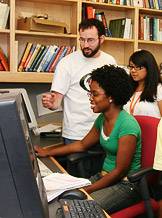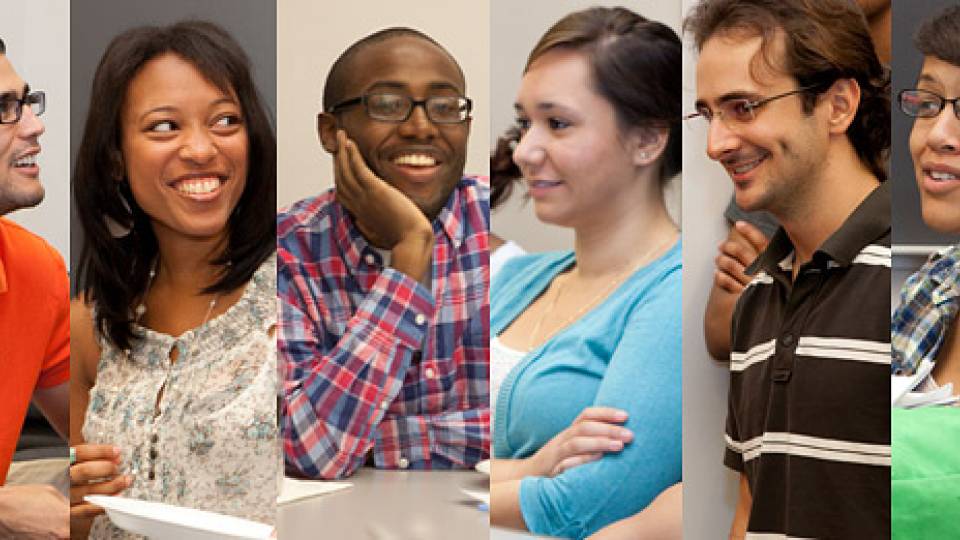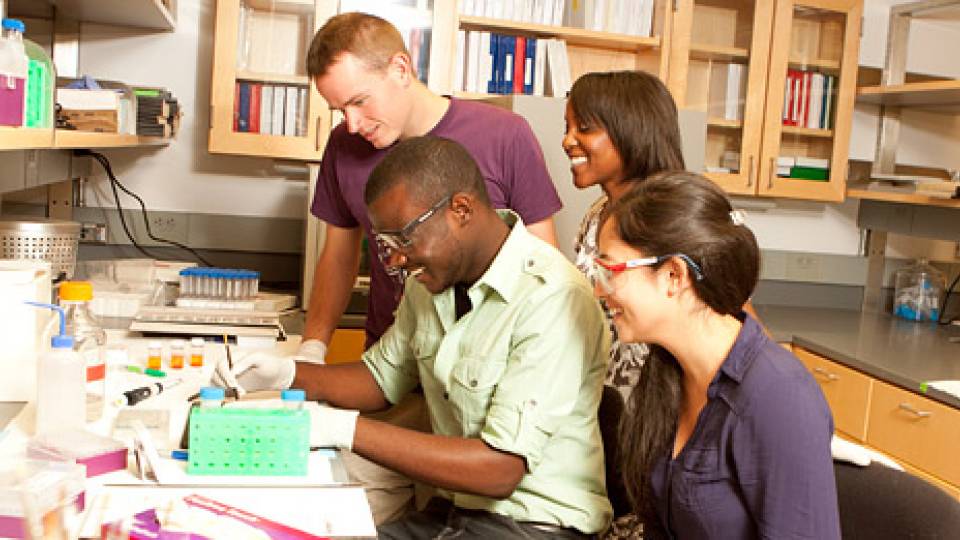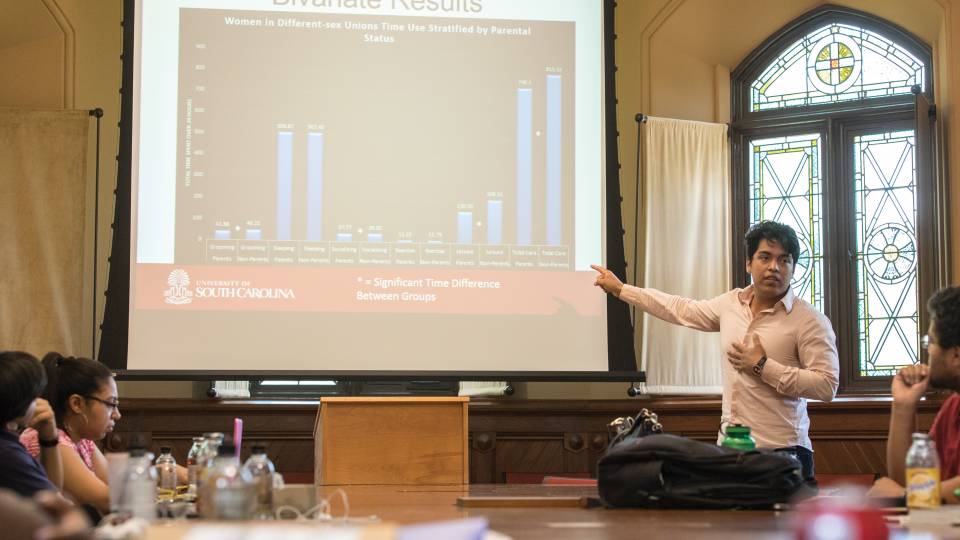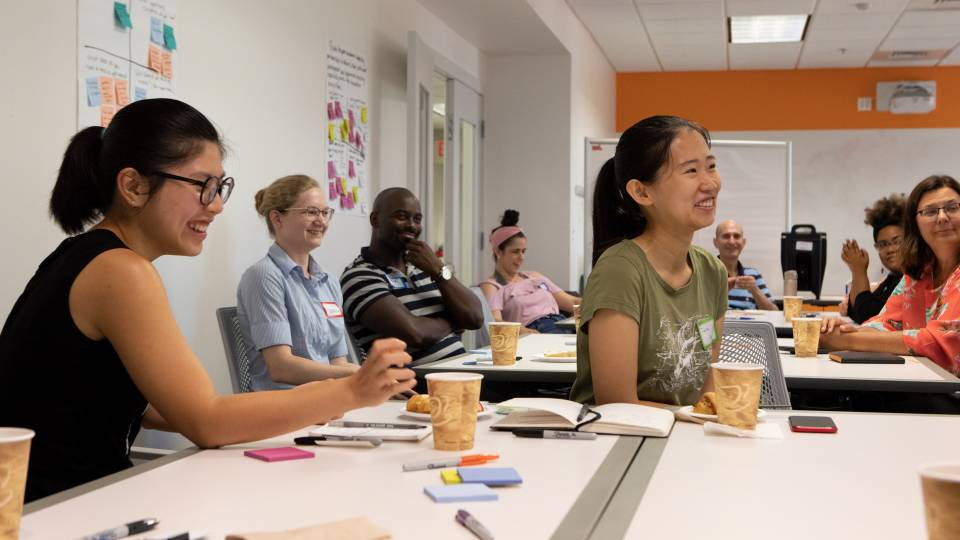Nina Lauharatanahirun is one of four young research assistants working this summer in the lab of Princeton psychologist Daniel Oppenheimer, studying questions related to judgment, decision-making and learning. This experience serves a dual purpose: Not only is she learning more about how others make decisions, she is getting a clearer sense of how to chart her own educational path.
Lauharatanahirun, a rising senior at California State University-Northridge majoring in psychology, is one of 17 academically talented undergraduates from around the country taking part in the Princeton Summer Undergraduate Research Experience (PSURE), a program run by the Graduate School for students who are interested in pursuing doctoral studies.
Lauharatanahirun is learning firsthand that graduate studies involve "a lot of individual work -- you have to have a lot of self-motivation," she said. "You really have to be passionate about what you're studying, which is why I'm glad that I was able to come this summer, because I was able to find out that studying judgment and decision-making is something I really want to pursue."
PSURE matches students with Princeton faculty and graduate student mentors from several departments who guide them on research projects, exposing the students to the intense independent research focus that is required of doctoral candidates. The program includes lectures, discussions and activities to teach the students about other aspects of graduate school, including workshops on the application process and financial aid and a newly created class to prepare them for the Graduate Record Examination. The students also practiced presenting their research at the annual symposium of the Leadership Alliance, a consortium of student summer research programs, held July 25-27 in Hartford, Conn.
The eight-week program, which runs through Aug. 8, is designed for undergraduates who have completed their sophomore or junior years and who express a serious interest in pursuing a Ph.D. and following a career in college or university teaching and research. Undergraduates who are underrepresented minorities, who are from socio-economically disadvantaged backgrounds or who are from liberal arts colleges are especially encouraged to apply.
"This program provides students with a great deal of information regarding graduate school and really is a revelation as to what research entails," said Ja'Pel Sumpter, a rising junior at Winston Salem State University majoring in chemistry. "Attending this program motivated and prepared me to work diligently toward graduate school."
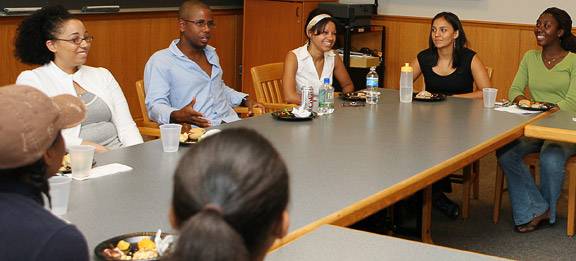
A panel of Princeton graduate students gave the PSURE students insights into aspects of the graduate school experience, from academic expectations to networking to balancing work/life issues.
Mark Starks, a rising junior at Morehouse College majoring in psychology, is one of the students working in Oppenheimer's lab this summer. Starks, whose project focuses on charitable giving, said he has developed valuable skills in conducting surveys both online and with live subjects and has enjoyed collaborating with his fellow PSURE students.
"I needed more research experience, and I wanted to expose myself to the different areas of psychology," he said of his decision to participate in the program.
Oppenheimer, an assistant professor of psychology and public affairs, said he believes many college students do not have a true understanding of the difference between undergraduate and graduate work. He leads daily research methods seminars for the PSURE students and is "treating them like graduate students -- I give them a project, let them go and meet with them every day to talk about it."
"The way graduate school works is you work on projects and learn through doing, and that's the model we've approached here," Oppenheimer said. "It becomes much more of a one-on-one mentorship with an adviser, who is training you in an apprenticeship style. It's very different from anything they have done."

Karen Jackson-Weaver, associate dean for academic affairs and diversity in the Graduate School, said PSURE students benefit from the bonds they form with their fellow undergraduates as well as their Princeton faculty and graduate student mentors.
Karen Jackson-Weaver, associate dean for academic affairs and diversity in the Graduate School, runs PSURE along with Elaine Willey, the school's academic affairs specialist. "For many of the students this is their first opportunity to work closely with renowned faculty at a world-class research university and to be immersed in the kind of environment that lends itself to doing independent research," Jackson-Weaver said. "PSURE is integral in providing the students with the support and resources they need to apply to graduate school."
Jackson-Weaver said she hopes that Princeton eventually will expand the PSURE program. "I really would like to invite more students, especially those who are historically underrepresented in doctoral programs, to apply and participate in this program. It's life-changing, and that's the type of feedback we have been getting," she said.
Three graduate students -- Ann Marie Russell in psychology, Jennifer Johnson in history and Monica Trujillo in sociology -- serve as program mentors and took part in a recent panel discussion in which PSURE students posed questions about the graduate school experience. They were joined on the panel by graduate students Onobu Akogwu in mechanical and aerospace engineering, Taniecea Arceneaux in applied and computational mathematics and David Stevens in politics.
The lively discussion covered a wide range of academic topics, such as faculty mentor selection, language requirements, general exams and dissertations, as well as social and personal issues such as deciding the right time to enroll in graduate school, networking, dealing with burnout and balancing work/life issues.
"The discussion is part of an ongoing conversation that we have been having with the PSURE students over the course of their time here about the challenges, rewards and realities of the graduate school experience," Russell said following the panel. "I thought this dialogue was fruitful in its own right in providing diverse, cross-disciplinary perspectives from graduate students with whom the PSURE students can really relate, and it's even more valuable in the greater context of the comprehensive, tangible and nuanced picture of graduate school that this program aims to provide."

This year's program involved 17 academically talented undergraduates from around the country. The University eventually hopes to expand PSURE and invite more students.
Brittany Carter, a rising senior at the University of Rochester majoring in history, said the panelists "were really helpful and candid" and that she now understands "much more about what you do in graduate school before your dissertation." Carter added that she enjoyed getting "more of an idea of the relationships that you develop, even in such a hyper-competitive atmosphere. All of the panelists seemed to have this camaraderie."
For many PSURE students, the bonds they form with their fellow participants, as well as their Princeton faculty and graduate student mentors, help inspire them to pursue their postgraduate goals, Jackson-Weaver said.
"One student said -- and it was so powerful for me to hear this -- that here many of the students feel like they have a community of peers," she said. "They appreciate the collegiality and they also feel very connected to the other students. For many of them, this is the first glimpse of what graduate school will be like, and I think for them it's transformative."
